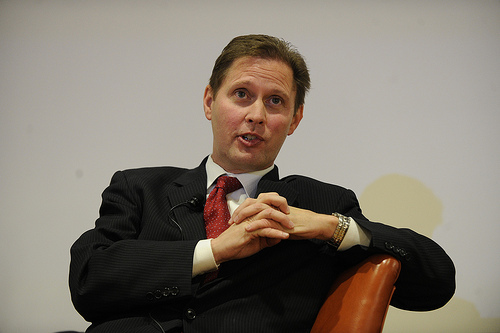Florida Governor Rick Scott has decided to go along with the Obama administration’s expansion of Medicaid, the most significant state under Republican control to do so. Peter Suderman explains the background:
It’s a dramatic reversal for Scott, a former health care executive and outspoken opponent of ObamaCare who spent an estimated $5 million of his own money trying to stop the health law before it was passed.
It’s also a reversal from what he promised his own advisers, says Michael Cannon, a Cato Institute health policy analyst who served on the health care task force for Governor Scott’s gubernatorial transition team.
During the transition period, Cannon says he “pushed hard” for the health care task force to recommend that Scott not implement any part of ObamaCare. When the time came to make that recommendation directly to Scott, Cannon says it didn’t require a hard sell. Scott quickly declared that he had no plans to implement any part of the health law in Florida. “I didn’t even have to make the pitch. He was already on board,” Cannon tells me. “That makes this an even more dramatic flip-flop.”
But Scott didn’t come away entirely empty handed:
But there may be a more immediate payoff. On Wednesday, Scott was granted a long-pending request for a Medicaid waiver up for approval with the Obama administration. With the waiver approved, the governor can shift large portions of the state’s Medicaid population into privately run Medicaid “managed care” plans.
“There’s been speculation that he’s doing it in a tit for tat with the administration,” Cannon says. “If they approve his Medicaid waiver he’ll drop his opposition to the Medicaid expansion. But if that’s the case, then his Medicaid waiver would move everyone into managed care, which economists have shown increases enrollment and increases spending. So if he made a deal, the deal was: He’d support their Medicaid expansion if they’d support his Medicaid expansion.”
The problem is that a managed care shift only improves costs, with little effect on outcomes, and the cost improvement is not great. Scott is still holding the line against state-run exchanges, however:
Scott sought to reassure conservatives on Wednesday that he still opposes “ObamaCare” by emphasizing his refusal to implement an exchange.
“Expanding access to Medicaid services for three years is a compassionate, common-sense step forward … it is not a white flag of surrender to government-run healthcare,” Scott said.
He said he still opposes the federal overhaul, but accepted that the Supreme Court’s decision and Obama’s reelection ensured that the Affordable Care Act is the law of the land.
“I believe in a different approach. But it doesn’t matter what I believe. It doesn’t matter what anybody believes. The Supreme Court made their decision,” he said.
But the Supreme Court allowed Scott to make this decision, giving states the freedom to take or reject the federal Medicaid dollars. He just chose not to use the power they gave. And it will cost taxpayers in Florida a great deal – as much as $20 billion over the next ten years in needed new tax revenue.





